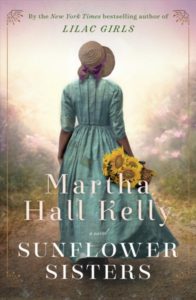Sunflower Sisters by Martha Hall Kelly [Book]

view/request
Martha Hall Kelly’s third foray into the lives and activism of the affluent Woolsey women is as well researched and engaging as Lilac Girls (2016) and Lost Roses (2019), and reaches back another generation to the American Civil War. As with her previous books, Kelly focuses on three women’s lives and loves: Georgeanna (Georgy) Woolsey leaves her privileged life to serve as a Union nurse alongside her former beau; Anne-May Wilson is a plantation and slave owner in the border state of Maryland; and Jemma is an enslaved woman on that plantation who is sold and then conscripted into the Union army. Sunflowers were used as a signal to enslaved people seeking freedom that danger was near, and more than once they serve to turn Jemma away from disaster. Crossing paths with President Lincoln and present at the battle of Gettysburg, Georgy sees the ravages of war and effects of slavery on her country. Anne-May’s husband and brother both enlist and are injured and killed respectively, while her self-importance draws her into espionage. Jemma’s family is subject to separation, punishment, and death at the whims of slaveowners and their proxies, and the dream of freedom sustains them. After Jemma leaves Maryland, she makes her way to the Woolsey home in New York City, remembering the address from a chance encounter months earlier. The family takes her in, fostering her skill for millinery. When Anne-May follows, fleeing accusations of treason and seeking to regain what she considers her stolen property, she is disappointed in both endeavors.
Drawing on real events and primary sources, these women’s stories illuminate parts of history infrequently told. Offer it to fans of Marie Benedict, the Civil War era, and readers who enjoy historical fiction starring real people.

